Two positive trade reviews for Charlie Wilson’s War went up today. Variety‘s Todd McCarthy called it “a smart, sophisticated entertainment for grownups…snappy, amusing and ruefully ironic.” And the Hollywood Reporter‘s Kirk Honeycutt said…well, it’s hard to find a tight summation of opinion, but he notes that this “outrageous tale of 1980s-era good corruption, apparently largely true and all the more outrageous for that, might be the perfect antidote to today’s shrill political scene with Republicans and Democrats staking out intractable positions and accomplishing little.”
Month: November 2007
Leicht on “No Country”
Another thoughtful letter about No Country for Old Men came in today, this one from HE reader Matthew Leicht. “I saw it yesterday, and it kind of shook me in a way that no movie has in recent memory,” he begins. “For the most part, there seems to be a debate over various scenes in the film and why they’re there, blah blah, but my thumbnail view is that this is a movie about principles and morals.
“Anton Chigurh is dismissed as a psycho by almost everyone in the film, but he explains in three different scenes (gas station, Carson Wells, Carla Jean) that he has a principle, and that he sees life as a fleeting occurance as opposed to some epic drama. He reduces life and death to a coin flip, which is masterfully played on with the random car accident that closes the film. Ed Tom Bell wants to make sense of life, Llewelyn wants to move forward…every character displays a certain moral compass. And this gradually led to a realization that felt like an avalanche.
“Ever since I began watching AMC’s Mad Men Ive been thinking more and more about our culture and if we are headed toward some kind of endgame. If you think about it, 1960 (when Mad Men is set) became a line of demarcation. The manipulation of the advertising world is a perfect backdrop for this. The industrial age had peaked and was beginning to recede. Americans were no longer suffering to get by. The Depression era was only a story told by grandparents, the struggle was over so we began to consume and were told that this is progress, that accumulation was the process by which to meet our goals.
“But as the material value began to rise in this country, the value and quality of human life seemed to decline. That’s an impression or appearance, at least, through the prism of a country without direction. And No Country for Old Men has had such an impact on me because it sums up the whole notion of humanity and the place in society we all hold.
“Anton will stop at nothing to get what he needs to get (or was commissioned to get). He justifies his actions by reducing life to something that just happens. There is no mystery, there is no catch. When he said to Carson something to the effect of ‘if the rule you live by got you to this point, what good is the rule?,’ the whole movie started to come together.
“Also at that point, the violence begins to subside (other than the driver of the truck that Moss gets into). We see Carson get shot from the reverse angle; Moss is killed off-screen (and we barely see the body), Carla Jean is killed and we don’t even know how. Hell, Anton may even succumb to his injuries. it becomes clearer and clearer that the dying is less significant, and it’s the living that matters.
“Ed Tom is such a significant character because he represents someone who doesn’t get involved, even though he could have prevented a lot of the killing. He doesn’t get involved because he can’t understand such behavior. He feels a level of disconnect from what is going on and to get involved would be almost like admitting defeat.
“I haven’t entertained a lot of the ideas brought up by some of your readers (a missing conversation between Anton and Ed Tom, the true nature of Carson, if Carla Jean was really killed, who was in the station wagon that hit Anton), mainly because they all feel a little bit like conspiracy theories. Kind of peripheral if you ask me because this movie delivers a very heavy pronouncement on the human condition, and it’s all on the screen. It’s been so long since a film had any real impact upon me, and I had to let you know.”
“Walk Hard” a year-end antidote
“I can’t tell you much about last night’s [Manhattan] screening of Walk Hard— there’s a review embargo for a few more weeks– but I will tell you this: I haven’t heard an audience laughing so hard since Superbad,” writes Screener‘s Katey Rich. “Coming after a long fall of grim (but often great) movies, Walk Hard is the perfect holiday season antidote for grownups, riotously silly but well-made, a thumb to the nose at the pretension and preening that often takes the screen this time of year.”
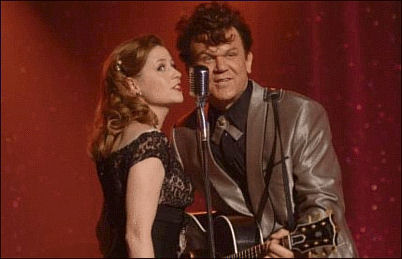
Karger pulling for “Clayton”
At last night’s Gotham Awards, Entertainment Weekly‘s Dave Karger confessed to The Envelope‘s Tom O’Neil that Michael Clayton is his favorite pet pony in the Best Picture race. And that strategy-wise, he sees Atonement and No Country for Old Men as the likeliest contenders.
No more Queen Latifah
A statement of general policy, effective now and locked for the indefinite future: I hereby refuse to see any movie starring Queen Latifah, and I’m going to really and truly think twice about any film in which she plays a supporting role. As far as I’m concerned every film she’s in carries the Mummy’s curse, and that includes the mostly insipid Hairspray.
Q.L.’s track record is worse than Cuba Gooding‘s even, and that’s saying something. The Perfect Holiday, Life Support, Stranger Than Fiction, Last Holiday, Beauty Shop, Barbershop 2: Back in Business, Chicago, etc. No reflection on her person or personality. She may be a great and generous human being, but her taste in movies seems to be primarily based on the concept of getting paid.
Wried passes along same rumor
A Wired/Underwired blogger named John Scott Lewinski said today that two sources (a working movie producer, the other a show-runner on an upcoming sci-fi pilot) have told him that the WGA strike is set for a 12.8 settlement, which is pretty close to what I heard last weekend about the strike settlement to be announced sometime close to Pearl Harbor day (i.e., Thursday, 12.7).
The bad news, he admits, is that he might be passing along “a rapidly spreading rumor that might be, in fact, a rapidly spreading rumor. Both of my sources refused to go on the record because the date is not official and they don’t want to appear stupid if the dispute wraps before or well after that date.” Throwing caution to the wind, Lewsinki writes that “when the strike ends on Dec. 8, I reported it here first.” Nope — you actually read it here first. On Saturday, 11.24. Not that it means anything.
Sundance ’08 lineup
Right off the top and without thinking too much, here are some gut-response standouts among the 2008 Sundance Film Festival selections. The dramatic competition, world cinema, world cinema docs and domestic docs were posted at 1 pm today by Variety‘s Todd McCarthy. Premiere selections will be released tomorrow.
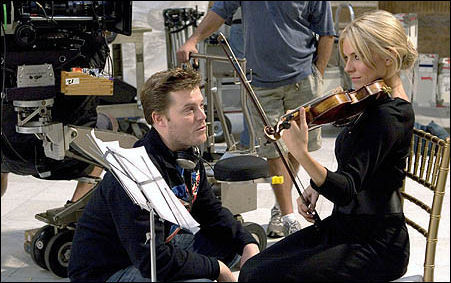
Rawson Marshall Thurber, Sienna Miller on the set of The Mysteries of Pittsburgh.
As usual, one looks for catchy or provocative subject matter, a proven director, veteran actors…anything that pops through among the Sundance grim-itude. You certainly need to be on the lookout for any film that appears to use chronic downerism as a badge of artistic sincerity or authority. Road movies, marginal lifestyles, bizarre dysfunctional behavior, warring family units, shattered dreams, sex with the wrong people for the wrong reasons, etc. Sundance spelled backwards = funky depression.
Geoff Haley‘s The Last Word, an “irreverent romantic comedy centering on a reclusive writer-for-hire of suicide notes,” sounds like a downer case in point. Winona Ryder, Wes Bentley and Ray Romano costar in this ThinkFilm release…yipes!
Any movie costarring the free-spirited Sam Rockwell needs to be approached with caution, I feel. I’m just saying “watch it”…nothing more. The film in question is Clark Gregg‘s Choke — a “raw mother-son comedy with Rockwell, Anjelica Huston and Kelly Macdonald, based on a novel by Chuck Palahniuk (Fight Club).
The Mysteries of Pittsburgh, directed and written by Rawson Marshall Thurber (Dodgeball) and starring Jon Foster, Peter Sarsgaard, Sienna Miller, Mena Suvari and Nick Nolte, sounds decent. I say this having read the book by Michael Chabon, which is about sexual exploration (a euphemism for anything gay) and a “tense” father-son relationship. Beware of any director who uses three names as it connotes pretentiousness.
Daniel Barnz‘s Phoebe in Wonderland, an “unusual coming-of-age tale” about a girl (Elle Fanning) who takes her dysfunctional family (some of whom may be played by Felicity Huffman, Patricia Clarkson, Bill Pullman and Campbell Scott) on an unexpected journey…God, another road movie?
A promising contender appears to be Christine Jeffs‘ Sunshine Cleaning, about a biohazard removal and crime-scene cleanup business with Amy Adams, Emily Blunt, Steve Zahn, Alan Arkin, Amy Redford and Clifton Collins Jr.
A sense of uncertainty pervades the synopsis of Jonathan Levine‘s The Wackness — great title! — about a teen drug dealer (Josh Peck) who falls for the daughter of his drug-taking shrink (Ben Kingsley). With Famke Janssen, Olivia Thirlby, Mary Kate Olsen and Method Man.
Among the docs, the social realism standout appears to be Nanette Burstein‘s American Teen, an “irreverent, frank account of four Indiana high school seniors.” It seems general enough in its subject and focus to have possibly lucked into something.
A celebrity portrait doc seemingly guaranteed to deliver a funny, stimulating time is Alex Gibney‘s Gonzo: The Life and Work of Dr. Hunter S. Thompson, a “look at the late author’s prime period of 1965-75 via previously unavailable homemovies, audio recordings and unpublished manuscripts.
Ditto Steven Sebring‘s Patti Smith: Dream of Life (please include footage of Smith reciting “Piss Factory”) and Marina Zenovich‘s Roman Polanski: Wanted and Desired.
Which doc will win the Al Gore award for best illuminating a dwindling resource/global contamination issue? Will it be Josh Tickell‘s Fields of Fuel, about a man who takes on “big oil, big government and big soy” as he proselytizes for energy alternatives, or Irena Salina‘s Flow: For Love of Water, about “the possibility that Earth’s supply of this essential liquid is dwindling.”
Docs about terrible histories and present-tense roblems in foreign countries include Lisa F. Jackson‘s The Greatest Silence: Rape in the Congo and Ellen Kuras and Thavisouk Phrasavath‘s Nerakhoon.
The hottest world cinema entry looks to be Jose Padhilla‘s Elite Squad, a Braizlian rime drama that’s been snapped up by the Weinstein Co. — about on a special crime unit’s war against drug dealers in the run-up to the Pope’s visit to Rio. Running a close second is Carlos Moreno‘s Perro Come Perro (Dog Eat Dog), a crime drama about “two hoods who sign their own death warrants when they bungle a job.”
A mildly interesting world doc appears to be Chris Waitt‘s A Complete History of My Sexual Failures, in which the filmmaker “consults the women in his life, past and present, to learn exactly how the opposite sex views him.” In other words, a documentary version of Neil Labute‘s Some Girls witha little Sherman’s March thrown in.
“There Will Be Blood” trailer
An excellent new trailer for There Will Be Blood — the best pocked-sized conveyance of what this film is — performances, plot points and all — is viewable from the Paramount Vantage website. But the embedded code is insane — it relaunches every time you refresh HE — and you’re forced to watch trailers for Into The Wild and other PV films over and over. It was torturous so I dumped it and replaced it with this YouTube trailer, which is almost as good.
Uncle Festus
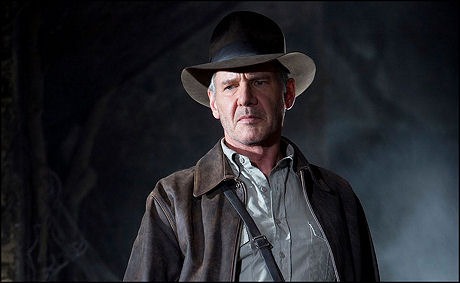
The spirit of Indiana Jones is obviously alive and well, but can the 2007 model — a.k.a., Uncle Festus — deliver the old brawny machismo that we all remember from the ’80s? That is the question.
E.T.’s 25th anniversary
I sense limited interest in the 25th anniversary screening of E.T., the Extra-Terrestrial at the Academy theatre on Thursday night. Just as Steven Spielberg‘s esteem has begun to diminish, so has the legend of this 1982 film. And I’m saying this as someone who truly worshipped E.T. when it first came out, and who interviewed Henry Thomas and Drew Barrymore for an Us magazine cover story.
It’s certainly one of Spielberg’s finest, but the saturation has been so commercially relentless — the Universal theme-park ride, that awful Neil Diamond song “Heartlight.” the endless parade of DVD re-dips — that it’s pretty much worn out its welcome. Universal’s eagerness to exploit it again and again has become boorish.
It wouldn’t kill me if by some bizarre circumstance I would never be allowed to see E.T. again. I think I could live with that. On top of which it has the usual Spielberg irritants. I’ve always been irritated by that moment when Henry Thomas just drops the pizza takeout on the back lawn. And I’ve always hated the scene in which security guys in space-walk suits invade the house.
Spielberg’s decision to digitally replace the guns in the hands of FBI agents with walkie-talkies wasn’t as bad as George Lucas’s decision to have Greedo shoot first, but it was in the same revisionist ballpark. I’m just done with it. Enough. Tens of thousands feel this way, I suspect.
Corliss on “Blood”
In a capsule review, Time critic Richard Corliss — usually a fairly adventurous sort and certainly no rigid conservative — has slammed Paul Thomas Anderson‘s There Will Be Blood (Paramount Vantage, 12.26), using terms like “daft” and “deranged zone.” No worries — it’s a solvable issue. Corliss has to see it a second time, is all.
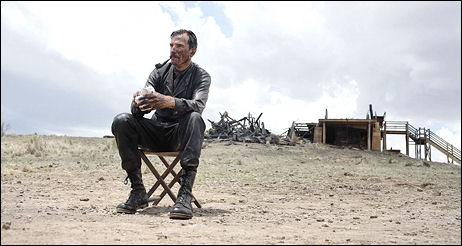
After my first Blood screening, I knew it was masterful but I felt traumatized, appalled, thrown off. The second time I saw it for what it was — a diseased but riveting American epic without an ounce of fat or pretense — and the matter of my initial emotional response went by the wayside.
“Ambition can drive a man to greatness or drive him to destruction, or do both,” Corliss begins. “That was the theme of many novels of the early 20th century. One, Upton Sinclair‘s “Oil”, is the inspiration for this inward, wayward epic that spans 30 years of a tycoon’s career. Daniel Plainview (Daniel Day-Lewis, parading surface charm over a black heart) builds an oil empire on his tenacity, his ruthlessness and his seeming saving grace: a devotion to his son (Dillon Freasier), whom he totes from job to job.
“Anderson’s previous movies (Hard Eight, Boogie Nights, Magnolia, Punch Drunk Love) all teemed with vigorous eccentrics muscling themselves onto the screen. This film is stern, unaccommodating and, finally, daft. It’s of a mind with its antihero, who says, ‘I don’t care to explain myself.’ By the end, when Daniel faces off with a longtime preacher rival (Paul Dano), the movie has retreated into its own deranged zone, to which even sympathetic viewers are forbidden.”
Giuliani vs. Wilson
Rudolph Giuliani has a brief but significant mention in Charlie Wilson’s War (Universal, 12.25) . It’s just a quick line in a consultation scene between Rep. Charlie Wilson (Tom Hanks) and his secretaries over his being investigated for snorting cocaine at a hot-tub party in Las Vegas in ’86. The debauch is depicted at the very beginning of the Mike Nichols film.
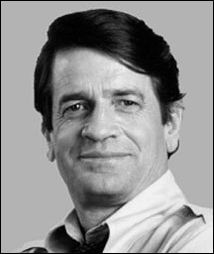

(l.) the real Rep. Charlie Wilson; (r.) Rudolph Giuliani
Wilson asks a secretary, “Who’s running the thing? Who’s the prosecutor?” She answers, “Rudolph Giuliani. From the Southern District.” Another assistant asks, “Do you know him?” Wilson says “no.”
The scene is obviously telling us that Giuliani was an opportunist looking to make headlines…which he was. Guliani was appointed U.S. Attorney for the Southern District of New York in ’83, and it was in this position that he first gained national prominence by prosecuting various mafiosos and white-collar criminals including Wall Street’s Ivan Boesky and Michael Milken for insider trading.
Wilson once said of Giuliani’s interest in his recreational Vegas sojourn: “It’s absolutely astounding the lengths to which the Justice Department have gone to try and figure out what I did in a hot tub in Las Vegas. If they had put the same resources into drug trafficking,,,there would be half as much heroin coming into the United States as there is now.”
